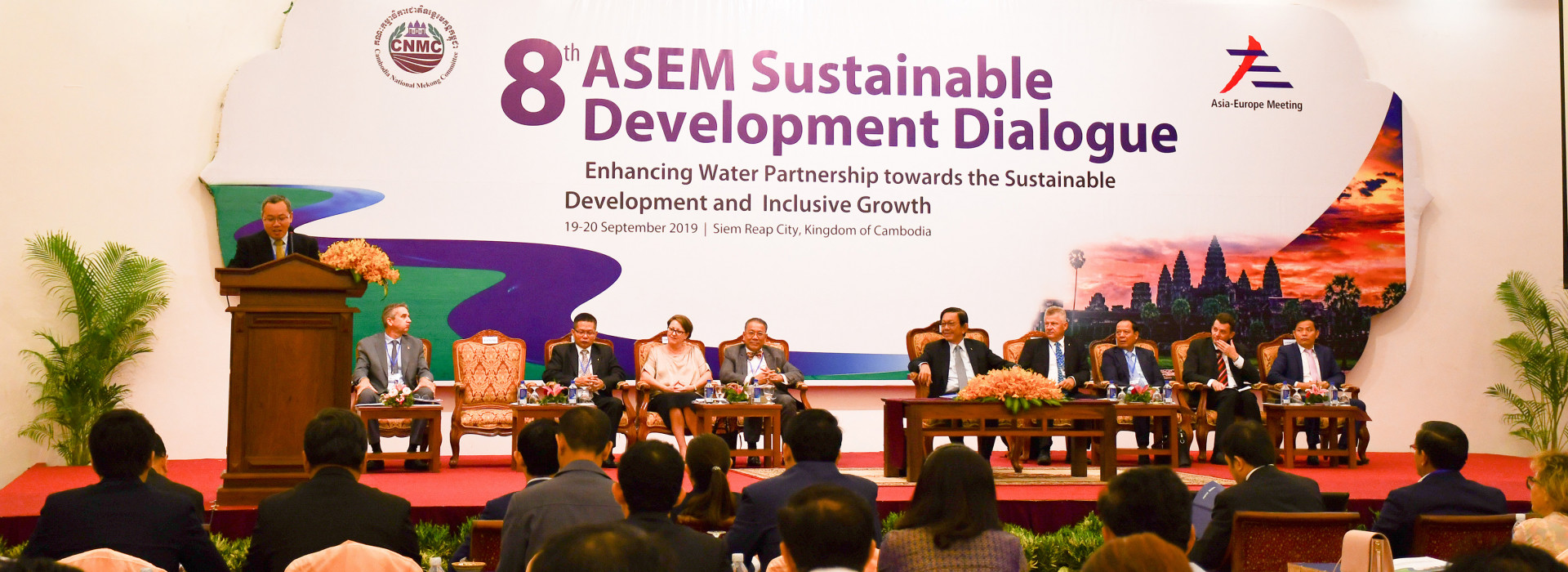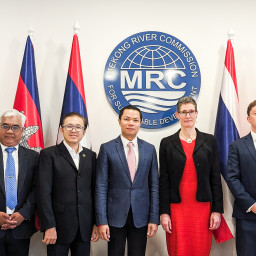Asia-Europe Meeting recommends actions to strengthen water partnership for sustainable development and inclusive growth
Siem Reap, Cambodia, 23 September 2019 — As a two-day 8th Asia-Europe Meeting Sustainable Development Dialogue concluded Friday last week in Cambodia’s Siem Reap, several recommendations were made to enhance water partnerships between the Mekong and European countries to achieve sustainable development and inclusive growth.
Hosted by Cambodia National Mekong Committee and supported by the MRC from 19 – 20 September, the annual gathering under the theme “Enhancing Water Partnership towards the Sustainable Development and Inclusive Growth” discussed key challenges and opportunities around cross-border river basin management. They included cooperation in transboundary water management, food and energy security, climate change, and flood and drought issues.
The Dialogue brought about 120 participants from river basin networks, academic institutions, public agencies, local and international NGOs, and inter-governmental organisations based in the EU and Asia as well as in Mekong region.

Participants attend the 8th Asia-Europe Meeting Sustainable Development Dialogue on Friday last week in Siem Reap, Cambodia.
“Due to emerging challenges such as climate change and increasing needs for development, while protecting the people’s well-being and the environment, water availability has become a major challenge, demanding our immediate attention and action,” said H. E. Mr. Lim Kean Hor, Minister of Water Resources and Meteorology and Chairman of CNMC, as he opened the Dialogue on July 19. “These issues need to be addressed to ensure water resources are managed, conserved and used effectively and sustainably.”
In light of these challenges, the Dialogue recommended there is a need to increase joint policy formulation and development planning when it comes to transboundary water partnership and cooperation. This would help ensure synergies and increase opportunities for improved water resources management.
The Dialogue also suggested it is important for water managers to establish and promote benefits sharing mechanisms in water development and collaboration. It noted such mechanisms would help to balance benefits and costs on a water resources sector-wide scale in the lower Mekong basin in the face of rapid water developments in the region.
The Dialogue participants found the 1995 Mekong Agreement on the Cooperation for the Sustainable Development of the Mekong River Basin, provided, despite gaps, a sound legal framework to guide cooperation and management of the Mekong River and related resources. To increase effective partnerships for water management and development, the attendees suggested river basin organizations make the best use of both emerging and existing cooperation frameworks, including that of the 1995 Mekong Agreement.
Finally, the Dialogue recommended that efforts to openly share data and information and to ensure proper coordination of developments should be strengthened because it is one of the key areas to achieving water resource development sustainability.
“A proper coordination between countries in the region and beyond is necessary to avoid or minimize potential transboundary risks and to maximise opportunities,” Chief Executive Officer of the MRC Secretariat Dr. An Pich Hatda told the gathering. “The development of the shared watercourse must be judicious, fair, reasonable and equitable. It must benefit everyone sharing the river.”
Along the line of these challenges and recommendations, the gathering also saw commitments by the government and partners.
Minister Lim Kean Hor, who is also the MRC Council member for Cambodia, told the meeting Cambodia is committed to addressing the challenges: “On behalf of the Government, I would like to emphasise our firm commitment in supporting and promoting regional and international cooperation and partnership for sustainable water management and development.”
Mr. Franck Viault, Minister Counseller and Head of Cooperation of the Delegation of the EU to Cambodia, said the EU is fully committed to promoting integrated water resources management and effective water governance for long-term stability. “This requires appropriate institutions, reliable data, capacity building, awareness-raising and funding,” he said. “It should foster sustainable water management as well as the consideration of interlinkages with, for instance, energy, food security and ecosystems.”
Mr. Zoltan Gyorgy Horvath, Charges d’affaires of the Hungarian Embassy, said in his capacity as the host of the 7th ASEM “Hungry is highly devoted to the achievement of the sustainable development goals and believes that the fulfilment of agenda 2030 requires an integrated and comprehensive approach.”
ASEM, comprising 53 partners from across Europe and Asia, is an informal platform for dialogue and cooperation between the two. Its partners represent about 65% of global Economy, 60% of global population, 55% of global trade, and 75% of global tourism.
Note to editors:
The MRC is an intergovernmental organisation for regional dialogue and cooperation in the lower Mekong river basin, established in 1995 based on the Mekong Agreement between Cambodia, Lao PDR, Thailand and Viet Nam. The organisation serves as a regional platform for water diplomacy as well as a knowledge hub of water resources management for the sustainable development of the region.
- END -





